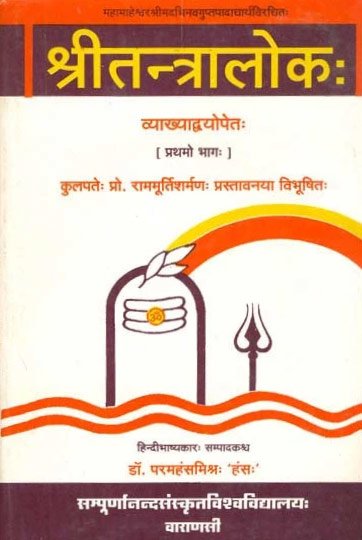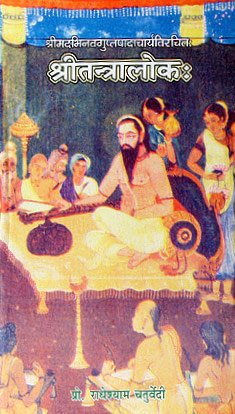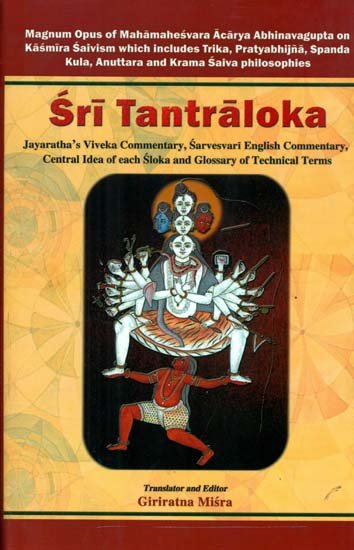Tantraloka [sanskrit text]
by Jun Takashima | 2020 | 46,255 words
The Sanskrit text of the Tantraloka of Abhinavagupta including grammatical analysis, English glossary and comparative print editions. The Tantraloka (“light on Tantra”) was written by Abhinavagupta in the 10th century in Kashmir and represents a major Encyclopedic work in Shaivism dealing with many core aspects and terminology.
Verse 13.181
क्रीडासु सुविरक्तात्मा शिवभावैकभावितः ।
माहात्म्यमेतत्सुश्रोणि प्रातिभस्य विधीयते ॥ १८१ ॥
krīḍāsu suviraktātmā śivabhāvaikabhāvitaḥ |
māhātmyametatsuśroṇi prātibhasya vidhīyate || 181 ||
The English translation of Tantraloka Verse 13.181 is contained in the book Sri Tantraloka by Satya Prakash Singh & Swami Maheshvarananda. This book is not available online so in order to read the full text and translation you should buy the book:
Buy now! English translation by Satya Prakash Singh & Swami Maheshvarananda (2015)
Glossary of Sanskrit terms
Note: This extracts Sanskrit terms and links to English definitions from the glossary, based on an experimental segmentation of verse (13.181). Some terms could be superfluous while some might not be mentioned. Click on the word to show English definitions.
Krida, Rakta, Asmad, Shivabhava, Ekabhavin, Tas, Mahatmya, Etad, Shroni, Pratibha, Vidh, Vidhi, Iyat, Iyata,
Analysis of Sanskrit grammar
Note: this is an experimental feature and only shows the first possible analysis of the Sanskrit text (Tantraloka Verse 13.181). If the system was successful in segmenting the sentence, you will see of which words it is made up of, generally consisting of Nouns, Pronouns, Verbs, Participles and Indeclinables. Click on the link to show all possible derivations of the word.
- Line 1: “krīḍāsu suviraktātmā śivabhāvaikabhāvitaḥ ”
- krīḍāsu -
-
krīḍā (noun, feminine)[locative plural]
- suvi -
-
sū (noun, masculine)[locative single]sū (noun, feminine)[locative single]
- raktāt -
-
rakta (noun, masculine)[adverb], [ablative single]rakta (noun, neuter)[adverb], [ablative single]√rag -> rakta (participle, masculine)[ablative single from √rag class 1 verb]√rag -> rakta (participle, neuter)[ablative single from √rag class 1 verb]√raj -> rakta (participle, masculine)[ablative single from √raj class 1 verb], [ablative single from √raj class 4 verb]√raj -> rakta (participle, neuter)[ablative single from √raj class 1 verb], [ablative single from √raj class 4 verb]√rañj -> rakta (participle, masculine)[ablative single from √rañj class 1 verb], [ablative single from √rañj class 4 verb]√rañj -> rakta (participle, neuter)[ablative single from √rañj class 1 verb], [ablative single from √rañj class 4 verb]
- mā -
-
mā (indeclinable particle)[indeclinable particle]mā (noun, feminine)[nominative single]asmad (pronoun, none)[accusative single]
- śivabhāvai -
-
śivabhāva (noun, masculine)[compound], [vocative single]śivabhāva (noun, neuter)[compound], [vocative single]
- ekabhāvi -
-
ekabhāvin (noun, masculine)[compound], [adverb]ekabhāvin (noun, neuter)[compound], [adverb], [nominative single], [vocative single], [accusative single]
- taḥ -
-
tas (noun, masculine)[compound], [vocative single]tas (noun, neuter)[compound], [nominative single], [vocative single], [accusative single]ta (noun, masculine)[nominative single]
- Line 2: “māhātmyametatsuśroṇi prātibhasya vidhīyate ”
- māhātmyam -
-
māhātmya (noun, neuter)[adverb], [nominative single], [accusative single]
- etatsu -
-
etad (noun, masculine)[locative plural]
- śroṇi -
-
śroṇi (noun, feminine)[compound], [adverb]śroṇī (noun, feminine)[adverb], [vocative single]
- prātibhasya -
-
prātibha (noun, masculine)[genitive single]prātibha (noun, neuter)[genitive single]
- vidhī -
-
vidhi (noun, feminine)[compound], [adverb], [nominative dual], [vocative dual], [accusative dual]vidhi (noun, masculine)[compound], [adverb], [nominative dual], [vocative dual], [accusative dual]vidhī (noun, masculine)[compound], [adverb], [vocative single]vidhī (noun, feminine)[compound], [adverb], [nominative single], [vocative single]vidhī (noun, neuter)[compound], [adverb], [nominative single], [vocative single], [accusative single]vidh (noun, masculine)[locative single]vidh (noun, neuter)[nominative dual], [vocative dual], [accusative dual], [locative single]
- iyate -
-
iyat (noun, masculine)[dative single]iyat (noun, neuter)[dative single]iyatā (noun, feminine)[nominative dual], [vocative single], [vocative dual], [accusative dual]√i (verb class 2)[present middle third plural]
Other editions:
Also see the following editions of the Sanskrit text or (alternative) English translations of the Tantraloka Verse 13.181
Sri Tantraloka (Set of 8 Volumes)
by Paramahansa Mishra (2000)
[श्री तन्त्रालोकः (संस्कृत एवं हिंदी अनुवाद)] Sanskrit Text with Hindi Translation; Published by Sampurnanand Sanskrit University; With two commentaries: Viveka (विवेक) by Ācārya Śrī Jayaratha and Nīrakṣīraviveka (नीरक्षीरविवेक) by Paramhans Mishra.
Buy now!
Tantraloka of Abhinavagupta (with Jnanavati Hindi commentary)
by Radheshyam Chaturvedi (2002)
[आचार्य अभिनवगुप्त द्वारा रचित तंत्रलोक: संस्कृत एवम् हिन्दी अनुवाद (पाँच खंडों में)] Sanskrit Text with Hindi Translation and Commentary; Published by Chaukhambha Vidya Bhawan.
Buy now!
Sri Tantraloka of Abhinavagupta
by Giriratna Misra (2018)
With Viveka Saṃskṛta Commentary by Rājānaka Jayaratha; Sanskrit Text, Transliteration, Sarveshwari English commentary; With Glossary and Central Idea of Each Śloka; Published by Chaukhamba Surbharati Prakashan
Buy now!![Tantraloka [sanskrit text] - book cover](/uploads/a/Tantraloka-Sanskrit.jpg)


